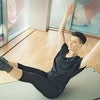Class #2771
Spiraldynamik® Principles
Description
About This Video
Transcript
Read Full Transcript
Hi, I'm Michael and I'm Tony. And today's workout is based on the principles and concepts of [inaudible] or an English spiral dynamic. And that's with a k. It was developed by an international research team led by Christian Larsen, a medical doctor from Switzerland. And it's based on the evolution of human locomotion. So throughout millions of years, nature has given us the intelligence of the human body.
Spiral dynamic provides an explanatory model of movement, a user's guide, you could say for the human body explaining its structural and organizational principles. So let's move. So for this workout you need a couple of props. You need this kind of a ball, which is like a bumpy ball. This is the easy grip ball from Franklin, but anything similar would work. You need something like a triad ball and you need a theraband along. Theraband is the easiest, but a shorter one can work as well. What else do we need? And a Pella or a pan for your knee, for any.
So get your props while we are going to lie down. So you're going to lie down with the little spiky ball and you're going to place it right underneath your tailbone and you're going to wiggle it around a little bit. Finding a place where you can feel that your pelvis is resting on top of it and you can feel comfortable more or less. So we going to move the pelvis and you're going to think of bringing the sitz bones, curling them up towards the ceiling, and then you release it and you bring the sitz bones down towards the mat. So if you're not right on the ball and can not bring them down, move your body a little bit.
So just rock between those two points of up and down. So what we're doing is we're moving through our transfer transfers access that goes from the right to the left, right through your body. Try to keep the ribs still. So we really just moving the pelvis. Let's do it one more time. You might feel that as the sitz bones go up, they come together and as you go down you might feel them separating a little bit. So just wherever you are, make sure you're even, and then relax. Bring your pelvis back to your neutral position.
Now we're going to move through our sagittal access, which is from the top to the bottom, from the front to the back of the body. So you're going to bring your rights, its bones towards your right heel, and then move your left sits bone towards your left heel, right? That's the first part. So now bring the right sitz bone almost to your left big toe, and then bring the left Sitz bone to the right big toe. So you feel the Sitz bond was going forward and then slightly in towards the midline of the body.
Thinking of your pelvis like it's like a plate lying on a table and rotating around itself is do a couple more. So we're working on, if you think of the functional unit of the spine with the head being the top pole and the pelvis being the bottom pole off that functional unit. And we're working now on the bottom pole. So let's find our middle again. If you're done right and left, we're going to move through our [inaudible] access, which is all the way come on top of a body going straight through and now we're going to bring the right half pelvic half down towards the floor and then bring it back up and then your left pelvic half to the floor. Try not to move the knees too much to side to side so the knees keep facing straight up.
You just allow the pelvic half to lower smoothly to the floor. Now because the ball is there, you might feel a little bit movement from side to side to side. It kinda like depends on how big the ball is you're using and that's okay, but make the intent of the movement to go straight down. Again, make sure you're even on your writing, your left before we move on. So find your neutral position again on the bar.
Now for some people it might be easier to bring the arms up and mimic the movement of the hips with your hands. We're going to imagine that our pelvic pelvis is a pedal and we're going to be in our canoe paddling backwards. So the right pelvic half goes down and then goes forward and then the left one goes down and forward. So you making sort of like a figure eight or think of it as paddling backwards. If the hands do not help you and confuse you, just bring them down because nothing is worse than being confused.
So make the movement as smooth as possible. We realize that this might be a little odd to you or for your body, so it might take a moment for it to get comfortable with it. Just keep going down, forward and up, down, forward and up. Let's do it one more time on each side and then relax for a second. Then curl the pelvis up and off the ball.
Take the ball out and slowly roll yourself down and feel how your, especially your lower back lands on on the floor. It might feel very different than normal, right? You might feel more contact on the bar, on the wall. What is it called? The floor or you might feel more lengths, you might feel more weight wherever the feeling is. It's okay. So you're going to take the ball again and now we're going to place it hind our head in on the neck.
And you want it as high as possible because we want to move as high up on our cervical spine. So again, we're going to move through our transfers access, which goes from ear to ear. And we're going to make the movement quite small. So don't make it a big movement. You're going to lift the chin up a little bit and then you bring it down a little bit. So it's like a nodding motion going up and down and you really try to make it on the first and second cervical. So we're not going to make it really big. We're not going to crank our neck. We are going to make it really small
Again, make sure you're even with right and left before you reelect your neck down. Take the hands off, take the ball out and just place it next to you because we don't need it for the next exercise and just let your spine settle down on the floor. Make sure you have good weight on your feet. We're going to start again with that. Coxix girls are we going to send our sits bones up towards the ceiling again and now continue to roll up with the hips to about halfway up and then as you exhale, just roll through the spine down and let your pelvis land on the floor again.
The sitz bones curl up. You might again feel them how they come towards together and then roll back down. And one more time we're rolling straight up and then rolling back down. Now it might help for next section to bring your hands on your rib cage. We're going to roll up squares or roll up straight up.
Now stop here for a second. Then the up position, put some pressure into the right side of your rib cage and press the right side down as you roll down. So we roll down on the right side of the body until the pelvic lands. We roll up square, roll up straight, and then roll down on the left side of the body. Now we want to make sure that you don't make that rotation from the hips. So roll up and really start putting the right side of your rib cage down.
There you go. And then roll up straight and roll down on the left side of the body. Let's do this one more time. You can inhale as you go up and you can exhale as you roll down on the right side and then we go up in the center and we go down on our left side. Now for the next one, we're going to go right left, right, left, right, left down.
So we're going to roll ourselves up square and you put some pressure on the right side and then the left side and the right side and the left side. Wiggle yourself down, still rolling through the spine at the same time. Rolling up the second time. You might want to start with the left. You might not. It's all good until the pelvis is down. Let's do two more sets. Rolling up. Just engage your doing right and left. All right, goes down.
The left, goes down, right, goes down. And then you have one more time leading up and leading with the left if you have chosen to do so. Then we elect yourself all the way down and bring the arms down next to your body and just take a deep breath in and then slowly roll over to your side.
Then once we have that, you're going to curl the right toes under the knee. We'll still be on the floor and now you're going to stretch leg. By thinking
Then flex the foot, curling the toes back under and bring them down to the floor. Stretched the leg through the center of that heel. Point the foot, flex the foot toes curled under and he relaxes back to the floor. One more time. Stretch that leg through the heel. Point that foot, flex the foot and relax it down.
Then on curl the toes so your foot's just relaxed and you're going to bend your leg foot up towards the ceiling. Knee still on the mat. From here, you're just going to lift the leg up and lower down. Now as you lift the leg, keep the weight of your pelvis on the ball and down, lifted up. Oh, lower it down. Now we're going to add on, so we're going to lift it up. You're going to bring your knee out to the side externally, rotating the leg just a little bit. Bring it back to the center.
Now internally, rotate by bringing your knee to the other knee and back center. Now just look, go out to the side and into your center in your own time, feeling the rotation coming from the head of the theme or and a couple of more times. Just let it gently rotate internally rotate, and as you're doing that, you want to try not to move that foot that's up towards the ceiling, which I know mine is doing, and then bring it back center and slowly relax that leg down and stretch it out. Roll over just your side a bit. Take the ball out and just lay there for a second and feel your hip. Be Aware. It might feel more open, it might feel heavier or you might feel nothing. That's all. Okay. Then let's do the other side. Just gently roll over to the other side.
Put in front of your ass,
[inaudible] [inaudible] leg release. Sit down. Now we'll add on. Push through the heel. Point that foot, flex the foot, curl the toes under and relax it down. Stretch through that heel, straightening the leg. Point the foot, flex the foot, curling those toes under and relax. One more time. Stretch it out. Long point the foot. Flex and curl those toes under and relax it down.
Then on curl the toes, foot, just relaxed and we're going to bend the leg and the side and then we're going to keeping the weight of hips on the ball. Just lift the leg up and lower down. Try Not to let your hip shift and lower down. Lift it up. Hello, we're down. Now we'll add on, lifted up. Bring the knee out to the side, externally rotating center. Bring it in towards the knee center, and now just go through that movement in your own time.
Try and feel the movement coming from the head of the Femur, not the muscles. Think bones and a couple of more times. Just rolling it through. Bring it back to the center. Release that leg down.
Yeah.
From there we'll start with the reverse kind of curl, and so you just let the sits bones up, sitz bones and your up down pubic bone comes toward your ribs. Stretch stretcher the hills, stretching the legs and release the knees down and release the pelvis. So pelvis releases up, sits bones down, pubic bone up towards the ribs, push through your heels to stretch those legs and we relax. Look, last time sitz bones up, sitz bones drop down towards your heels. As you pull the pubic bone up toward your ribs stretch heel point. Those feet feel that stretched to their legs.
Flex the feet curly and they tell us back on their back to the floor and relax. Then just let the legs go long. From there. We're going to do a thoracic extension, so you're going to push down with the four arms, push down into the mat and in towards your body to stabilize those shoulders and release. Do it one more time, just pushing downN , N , stabilizing the shoulders. Then lengthen your spine through the crown of your and income up in thoracic extension, and then think of the length in the spine, pulling it out from the con of your head as you bring your body down and relax everything, including your arms, the forearms pressed down in stabilizing those shoulders. You lengthen the spine long kind of your head coming up in the thoracic extension and then lengthen it out, bringing it down and relax everything down.
Last time, pressed down into the forearms, pulling him in, stabilizing his shoulders, lengthen the spine, lengthen coming up in that extension and then slowly relax yourself. Then then take a moment there. Just relax yourself. I'm going to put this all together, no little combo, so as relaxing. Just want to curl those toes under. Keep your head ran in the forearm. From here. We're going to start with the reversed Cox. Six Curl the baby pad.
You release your sitz bones up to the ceiling. Sitz bones down towards the heels at the pubic bone pose up towards the ribs. Push the your heels straightening legs as you push into your forearm. From there, point the feet. Lift the chest in the head.
Then flex the feet. Bring the knees down. Yeah,
Then flex the feet off the knees.
You're going to place one knee on top. We'll start with the right. You want to make sure the foot is directly behind you long so the knee is aligned with the ankle. You can do it with the foot long, like tone. We'll do our, you can do it with the toes curled under instead of getting more stretched too. For some people pushing through the heel, front leg is going to be, the knee is going to be right over the ankle, totally in line. And what we're going to do is a little hip stretch. So again, we're going to release those sitz bones back.
Then we're going to curl the coccsyx op and you'll feel the stretch in your hip and release. Now if you put your hand right on your hip, you can feel your FEMA move. It's of cool. So you released the sitz bones back, and as you pull the pubic bone up through the ribs, you can feel the rotation of the head of the Femur and the hip as you stretch out the hip and release one more time, pull it up, stretch that out, and we release. Then we're gonna be doing that doctor stretch. So you're going to change the angle of the leg and you're going to bring the front foot out. Now from here, you're going to start the same way. You're going to just release the sits bones back, pulling the pubic bone up towards your ribs, but your center now going to be at an angle. This is my new center, so release the sits bones back, pull the pubic bone up towards your rib cage. Keep that position stretch, bending their front leg forward, and you'll get that at doctor stretch. Come back [inaudible].
Now if you're not feeling enough stretch, move the foot forward and you can also help yourself in that external rotation by stretching forward and bringing it back in. Now it's very important that you keep that feeling we had in the beginning where this sits. Bones, go back, pubic bone up to your nose. Keep that stretch in the hip as we're stretching the ED doctors and you can help with the rotation. One more time, just your wretched out and bring it back in and relax and we'll change sides. So take your pad or your pillow underneath your knee. Okay. Same thing here. Toes can be long or curled on here.
Front foot right in line. So everything is square in line. Release the sits bones back. Think of pulling the pubic bone up towards your rib cage. Would they sit back, pull it up? And like what we did on the other side, you can put your hand right on your hip release and pull it up one last time here they feel the stretch of that hip and relaxed. They changed the angle, the legs, the leg ball now got this way. Toes long are curled under front leg. Move it forward a bit.
Stretch the ED doctors. So again, we started with releasing the sitz bones back, pulling the pubic bone up and release. Now keep that up feeling okay as we stretch forward, bending that knee and you can hands can help that rotation and really think of that head of that femur externally rotating as a stretch, just the doctors [inaudible] and for the last stretch, move it a little bit forward so we get just a little bit more. One can always have more and we relax. Dan, you don't need your pillow for the next one. So you're going to be in a cat stretch position.
So just place your hands down and your shoulders are going to be right behind, um, above your wrists and your hips right above your knees. Now stay in a long position and see if you can connect the ribs to your pelvis. So the bottom and
And then as the rips sent back, send the bottom rips back as well so you stay here in the flat position. We're going to do the same concept with the upper body or the upper ribs, so we're going to push through the crown of the head, slide into an extension, pushing the rips, the top rips towards our head, and then come back to the straight line and think of the top rips following the head as we go forward. But don't forget the lower ribs are still pointing to our pelvis. Now let's put it all together into a round in complete flection. Then as we go to a straight line, the sitz bones reach back.
The bottom rips follow the pelvis, the crown of the head goes up and the top rips follow the head. That was a lot of information. Now let's go to a flection. There sits bonds, go back the bottom, ribs follow. Now let's go into a slight extension with the lower back as well. So let the Sitz bones point up a little bit, but don't forget those rips following and they don't drop down to the floor, but they still reach to our pelvis, rounded in one more time into deflection.
When we go to our flat line, make sure the bottom ribs follow that pelvis as we go into our extension, the top reps follow the head, but the bottom ribs still follow the pelvis and then come to straight and just release back for just a second. Then come back to that same position, the cat stretch position or quad revet and bring the fingers a little bit in towards each other. Each other there will soften your elbows a little bit and that's okay. So now we're going to create a little bit of rotation. Keep the left elbow where it is now, bend the right elbow more and that creates a little rotation, bringing the rips around the corner and then come back to straight.
Then let's go to the other side. Bending the left arm, tried to keep the right arm where it was slightly bent, but it does not bend more and come back up. Let's do it one more time. Now initiate not by bending the elbow but initiate by moving your rib cage around the corner and as the ribcage moves it will unlock that arm more and then come back to the center. So initiated with the rib cage and then let it flow through. If this feels comfortable both for you, you want to make it a little bit bigger. Here we go. So rotate it, bend it and then take that right arm off and slide it underneath yourself and go further down. If the previous exercise was enough for you, stay there and then come back up and place the hand back down.
Initiate with the ribcage and then follow through. Once you're ready for it, let's do one more set on each side so we rotate the arms come through. Now make sure you have even weight on both knees and the sits bones point straight back. Try while you're here to get that bottom rib still attached to that, that pelvis, and then come back up. Here we go. Let's go the other side.
Rotate the per rib cage slightly arm through. Go all the way down, or as far as comfortable, try to keep the weight on both knees, keep the spine nice and long and attached those ribs, the bottom ribs to the pelvis, and then come back up and then sit back on your heels. Relaxing the body for a little bit. So slowly roll yourself up. And then we're going to use most of our props for the next exercise.
So you want to get your theraband set up first and you're going to place it across your mat. And we're going to lie on your side with most of the theraband behind you, right? So if you gonna lie down facing your right on your left side, make sure that the theraband is behind you, okay? Then you're going to get your tribe out. Now when you're going to lie down, you're going to make sure that the middle of your ribs is right on the theraband. So it locks it in. Okay. And then you're going to place the bar between the knees and the legs are at a 90 degree angle. There we go.
Just extend the bottom leg out. You can just let rest your head on top of it. If you want a pillow for that arm and place the pillow down, please do so. So make sure that your knees are really up so that you're in a 90 degree angle. And now the top arm reaches over your butt and touches that sits bond back there. So getting in contact with your own zip, but now your feet are staying on top of each other. And for some of us, like me, I like to Hook
First we just going to move the ball forward with the upper leg. So push your top knee forward and then push it top knee back. Just roll this forward towards the wall in front of you and then back. Let's do it one more time. Roll forward and back, and then stop again in the middle. Now think of your as I as the top half of your pelvis and bring that top half in towards your navel.
So it goes a little bit forward and in, and then you spiral it out back to where it came from. So as the pelvis spirals in, you will feel your sitz bone going up towards the ceiling and then you bring it back and down towards the other sitz bone. So the Sitz bone goes forward and up as we go forward and it goes back and down. When we come down, it goes forward and up, back and down. One more time, forward and up, back and down. And I leave that out, feel that spiral, that outward, spiral up the top hip and then relax.
So you're going to reach behind you and go to get your theraband. Try to keep the band as wide as possible just because it's the most comfortable, but also gifts too. Most feedback to the body, you want to tighten a little bit and then place that hand on the opposite side of your mat, about the height of your eyes, the handle. Stay on the floor. At that same angle. We'll just go into bend arm once we start moving. Now pay attention to the top shoulder.
Make sure it stays down back and in so it rotates on top of our rib cage. You're going to slowly bring your nose towards the floor and rotate your rib cage towards what's the floor, allowing the theraband to help us. And then we rotate ourselves back against the theraband back home. Don't move your hand. Just bend the elbows as we go forward. And then the arm slightly stretches as we go back.
Now try not to move the pelvis or the ball so that pelvis stays in that outward spiral as we go in with our rib cage. And then come back to our center. Now release the tension on the theraband a little bit and bring the arms straight out. Shoulder height. So now the arm is straight. You still keep the shoulder blade connected, not press the sternum forward, pushing the arm forward and then bring the sternum back. So you have again that same rotation.
We pressed the sternum forward and make sure that the shoulder does not do the work. But the rib Cates does, and come back. We have one more to go. We press forward and we press back. Then come back to the center and let go of your theraband. You can also put the the ball away.
You don't to straighten the leg, the top like out in line with your body. We don't do. Make sure we have that outward spiral again from our pelvis so the sitz bone goes down and back and then lift the leg up. Bring the leg straight to the front like a sidekick motion. Bring the leg straight in line and stop.
Now keep that pelvis where it is. Just bring the like slightly back behind you without adjusting the pelvis. It's a small movement. Bring it back to the center. Go to the front, bring it in line, connect the pelvis and then just move that leg slightly back. There you go. So let's add on. We'd go to the front, we bring it in line. The leg goes back. Now if you cannot go any further than allow the top hip to slightly rock backwards a little bit. Now here, make sure that you don't externally rotate it femur so the leg stays parallel.
Come back to the center. We go to the front, we go in line, we go slightly back and then we adjust the pelvis going outward. Bring it back together. Let's put it all together. That's going to be exciting. So duck theraband. Hold onto there man. The arm is right in front of you. We bring the leg to the front. We bring the leg in line. We bring the leg back behind us.
Now as our pelvic pelvis starts to spiral backwards, so move it back. Our ribcage starts to move forward and the pelvis and the rib cage keep moving away from each other and you get the lovely stretch over there and then come back to the center. We go to the front, we go in line, we go back. As we spiral the pelvis backwards, our replicates spirals forward. Watch out for that leg. It does not lower down to the floor and come back to the center. We go to the front for the last time in line, we go back. We spiral backwards with our pelvis.
As the rib cage goes forward. Now think of pushing the hand and the foot away from each other. And I'll stay here and I'll lower the leg and lift the leg. You lower the leg and lift the leg and keep reaching long with that leg. Make sure it's its parallel. And four we have one more time to go.
You might feel a huge stretch there. And then bring everything back together. Your knee, let go of the fair band
You're going to make sure you have your oh you try ball with you. So you know to lie down on your side with your top of your or the middle of your rib cage on top of the theraband, the arms long except the end. And the tried ball is between your legs. Adjust your foot if necessary. And there we go. The top hand goes up and over reaches for our six bone.
Now just move the leg, the top leg forward and backwards and forward and backwards. There you go. There's it. One more time. Rocking forward, rocking backwards, and then come back to the center. Now we're going to move the top pelvic half, rotated inward towards it, spiral it in and then spiraling it out. As we go in, we feel our shit's bone going up and forward. As we go back, we press our sits bone down and back.
We go in and forked and we go back and we go in and forward and we go back in, down. Let's do it one more time. We go in and forward. We go back and down and we're going to stay there. There you go. So reach behind you to grab the sand band, get a nice little tension on the band and place the hand on the front edge of your mat about I hiked, made sure you show the blade is connected and the hips are on top of each other. So we're going to turn our head towards the floor and rotate the student towards it and then wrote the age yourself back.
There we go. So then the arm as you go, trying not to make the movement in the shoulder but really in the rib gauge and then come back. Let's do it one more time. We turn our head and we rotate and we come back to the center and we relax. Then take a little bit of the tension off the theraband and bring the arm right in front of a view in shoulder height. Connect that shoulder blade, press the sternum forward as we go and do a rotation and then bring the sternum back. As we rotate back and forward, try not to move the ball as we go forward and backwards. Let's do it one more time. We go forward keeping that rotation and then backwards into the rotation.
And then we lax good. Take the band away. We're going to take the ball away because we don't need it anymore, so straighten out the top leg and get it in line with your body. So we're going to get a nice long line. Then you're going to lift that leg up. We're going to bring the leg to the front as far as we can, and then we bring it back in line and you want to make sure that pelvis does not change as we bring the leg behind us and then bring it back in line. So we go front, we go in line and then slightly back without changing our palace.
Come back in line, bring it to the front. We go into a line. Now allow the electrical behind you and then allow the pelvis to rote it ever so slightly spiraling backwards. And then come back to the center. We go to the front, we go in line, we go back and then allow it to spiral backwards. Now Watch out in the leg does not lower too much and does not externally rotate.
Come back to the center and relax. Let's put it all together. So we're going to hold onto the band. We're going to bring it shoulder height. We're going to lift that leg up. Here we go. Bring her to the front, bring it in line. Bring the like back. Now as we spiral that, the pelvis backwards, we're going to move our ribcage forward so we rotate the pelvis and the ribcage against each other and then bring everything back to the center.
We go to the front, we go back in line, we bring it back. Now spiral that hip outward as the ribcage spirals inward towards the floor, feel that opposition and come back to the center for the last time we go front. We go in line, we bring it back, we spiral outward with the pelvis inward with the, with the rib cage. Now feel it oppositional, stretch from the hand all the way to the foot. Keep that reaching and then lower the leg and lift the leg and lower and lifting. Keep reaching wall as long as you can. Two more times reaching one and out and the last time reaching.
And then roll everything back to alignment. Bend the knee and let go of the fair event. So now slowly get rid of the theraband and just roll yourself over to your back and just take a moment for your body to settle. You're going to have your legs bent. You can have your like straight, just wiggle it around a little bit. Ah, and then just take a moment for the body to just settle back down, take a big breath in, and then exhale, slowly bend your knees, roll over to your side and slowly push yourself up to a sitting position. So that was your spiral dynamics class.
So thank you and thank you, Christian. Thank you Monica. And thank you ana.
Comments
You need to be a subscriber to post a comment.
Please Log In or Create an Account to start your free trial.





















